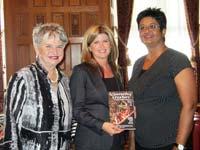False ideas of ‘honour’ chronicled by Canadian

Both riveting and inspiring, Unworthy Creature: A Punjabi Daughter’s Memoir of Honour, Shame and Love spans four countries and two continents over the course of one woman’s life. The memoir, co-authored by Barbara Kay, a columnist for Canada’s National Post, traces the life of Aruna Papp, a South Asian immigrant to Canada who grew up in a divided Punjab in post-Partition India.
As an Indian-Punjabi Christian, Papp was quick to realise that she and her family were way down the totem pole of India’s rigid caste structure. Often referred to as “untouchables” who converted to Christianity so they could climb up the social ladder, her family had to live with the contempt shown by Hindus, Muslims and Sikhs.
Papp’s early years in East Punjab were steeped in a culture where honour and shame were predominantly tied to women’s sexuality. The concept of honour surrounding women’s sexuality dictates to a large extent how they interact with not only their immediate family but with society at large. This “honour” is controlled solely by the males in a society where patriarchy is supreme and unchallenged.
Raped in her teens by a male relative 17 years older than her, Papp was quick to realise there was no use complaining. This gruesome assault was not uncommon in a society drowning in false ideas of “honour”.
Papp traces her journey in this book. Growing up as the oldest of seven children, her father a pastor in the Seventh Day Adventist Church, Papp has fond memories of visiting Lahore’s Christian Town where her maternal grandmother lived. Those trips to Pakistan stopped after it became difficult to procure visas.
The book explores themes of female infanticide, preferring sons over daughters, abortion and a glaring lack of love for the female child. They are, she says, as relevant today as they were 50 years ago, particularly among the South Asian diaspora in the West. The lives of many South Asian women in Canada are defined and sometimes dictated by “honour” and “shame” and as Unworthy Creatures clearly shows, it is often far more difficult to get rid of cultural and social baggage than it is generally assumed.
The memoir goes on to chronicle her courageous battle to help other South Asian women trapped in a patriarchal cycle to claim their rights as Canadian citizens. Papp came to Canada as a young wife in an arranged, loveless marriage, with two young children and the equivalent of a third grade education. Living in an abusive relationship and working as a gym attendant in Toronto’s York University, she was slowly introduced to the rights and protections Canada offers women.
Her own experiences catapulted her on a frightening but empowering psychological and intellectual journey that would ultimately lead to two graduate degrees, a second loving and mutually respectful marriage, and a pioneering career in counselling troubled families like her own.
As a vocal and sometimes unpopular advocate of South Asian women suffering abuse, Papp is often accused of painting the entire community with the same brush. Disregarding this criticism, she feels it matters little if in the end she can help even one woman escape violence at home or from being forced into a marriage she doesn’t want. Papp is on her way to training frontline workers, mainly the police, who are often the first to be called in to deal with cases of domestic violence.
Speaking plainly, sometimes to the point of being blunt, Papp is often the voice of thousands of girls and women living in isolation and quiet desperation in an honour-based culture which, it seems, is thriving in pockets of South Asian community in Canada and beyond.
Leave a comment









